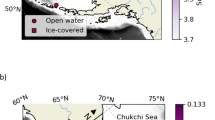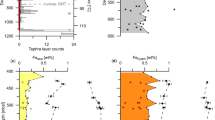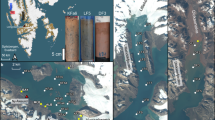Abstract
Reported changes in the composition of marine pore water on contact with air1–4 led us to investigate whether air-exposure of marine sediment might alter its interstitial concentrations of nitrate and boron. Nitrate should be a good indicator of changes in the oxidation state of marine sediments5,6, and interstitial boron should reflect changes in the reactivity of sedimentary components because it bonds to clays7,8 and sediments in a temperature-sensitive manner. We report here that interstitial nitrate concentrations can increase considerably during air exposure of marine sediment and that interstitial boron can be scavenged from some reducing sediment. Sedimentary boron scavenging may affect oceanic boron, but the process may be influenced by interstitial components that prevent the uptake of boron onto freshly formed hydrous ferric oxides.
This is a preview of subscription content, access via your institution
Access options
Subscribe to this journal
Receive 51 print issues and online access
$199.00 per year
only $3.90 per issue
Buy this article
- Purchase on Springer Link
- Instant access to full article PDF
Prices may be subject to local taxes which are calculated during checkout
Similar content being viewed by others
References
Bray, J. T., Bricker, O. P. & Troup, B. N. Science 180, 1362–1364 (1973).
Troup, B. N., Bricker, O. P. & Bray, J. T. Nature 249, 237–239 (1974).
Loder, T. C., Lyons, W. B., Murray, S. & McGuinness, H. D. Nature 273, 373–374 (1978).
Lyons, W. B., Gaudette, H. E. & Smith, G. M. Nature 277, 48–49 (1979).
Pamatmat, M. M. Int. Rev. Hydrobiol. 58, 345–368 (1973).
Bender, M. L., Fanning, K. A., Froelich, P. N., Heath, G. R. & Maynard, V. Science 198, 605–609 (1977).
Lerman, A. Sedimentology 6, 267–286 (1966).
Couch, E. L. & Grimm, R. E. Clays Clay Miner. 16, 249–256 (1968).
Sayles, F. L., Manheim, F. T. & Waterman, L. S. Init. Rep. DSDP Leg 20 (1973).
Uppström, L. R. Analyt. chim. acta 43, 475–486 (1968).
Armstrong, F. A. J., Stearns, C. R. & Strickland, J. D. H. Deep-Sea Res. 14, 381–389 (1967).
Sverdrup, H. U., Johnson, M. W. & Fleming, R. H. The Oceans, Their Physics, Chemistry, and General Biology, 967–969 (Prentice-Hall, Englewood Cliffs, 1942).
Uppström, L. R. Deep-Sea Res. 21, 161–162 (1974).
Fanning, K. A. & Maynard, V. Neth. J. Sea Res. 12, 345–354 (1978).
Braman, R. S. in Treatise on Analytical Chemistry, Part II Vol. 10 (eds Kolthoff, I. M. & Elving, P. J.) 1–101 (Wiley, New York, 1978).
Gast, J. A. & Thompson, T. G. Analyt. Chem. 30, 1549–1551 (1958).
Froelich, P. N. et al. Geochim. cosmochim. Acta 43, 1075–1090 (1979).
Modzeleski, J. E., Laurie, W. A. & Nagy, B. Geochim. cosmochim. Acta 35, 825–838 (1971).
Author information
Authors and Affiliations
Rights and permissions
About this article
Cite this article
Fanning, K., Maynard-Hensley, V. Oxidative changes to nitrate and boron in marine pore waters. Nature 287, 38–41 (1980). https://doi.org/10.1038/287038a0
Received:
Accepted:
Issue Date:
DOI: https://doi.org/10.1038/287038a0
Comments
By submitting a comment you agree to abide by our Terms and Community Guidelines. If you find something abusive or that does not comply with our terms or guidelines please flag it as inappropriate.



